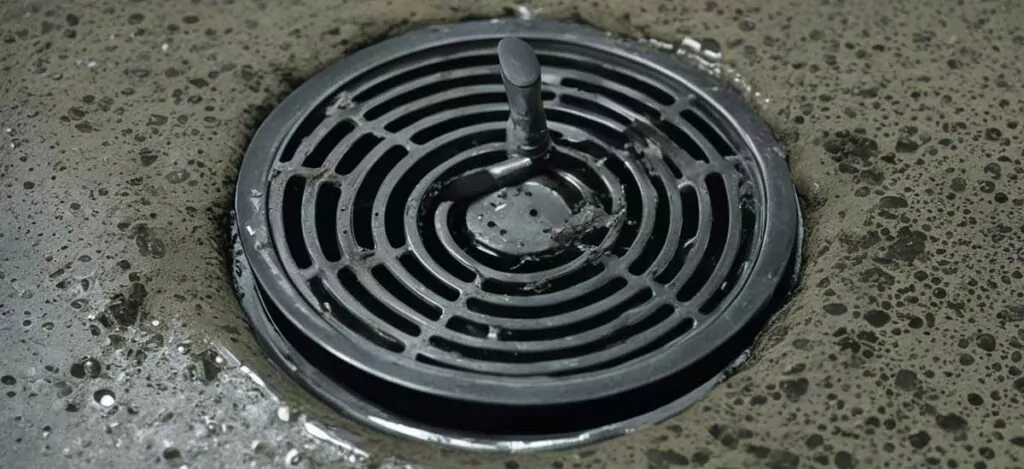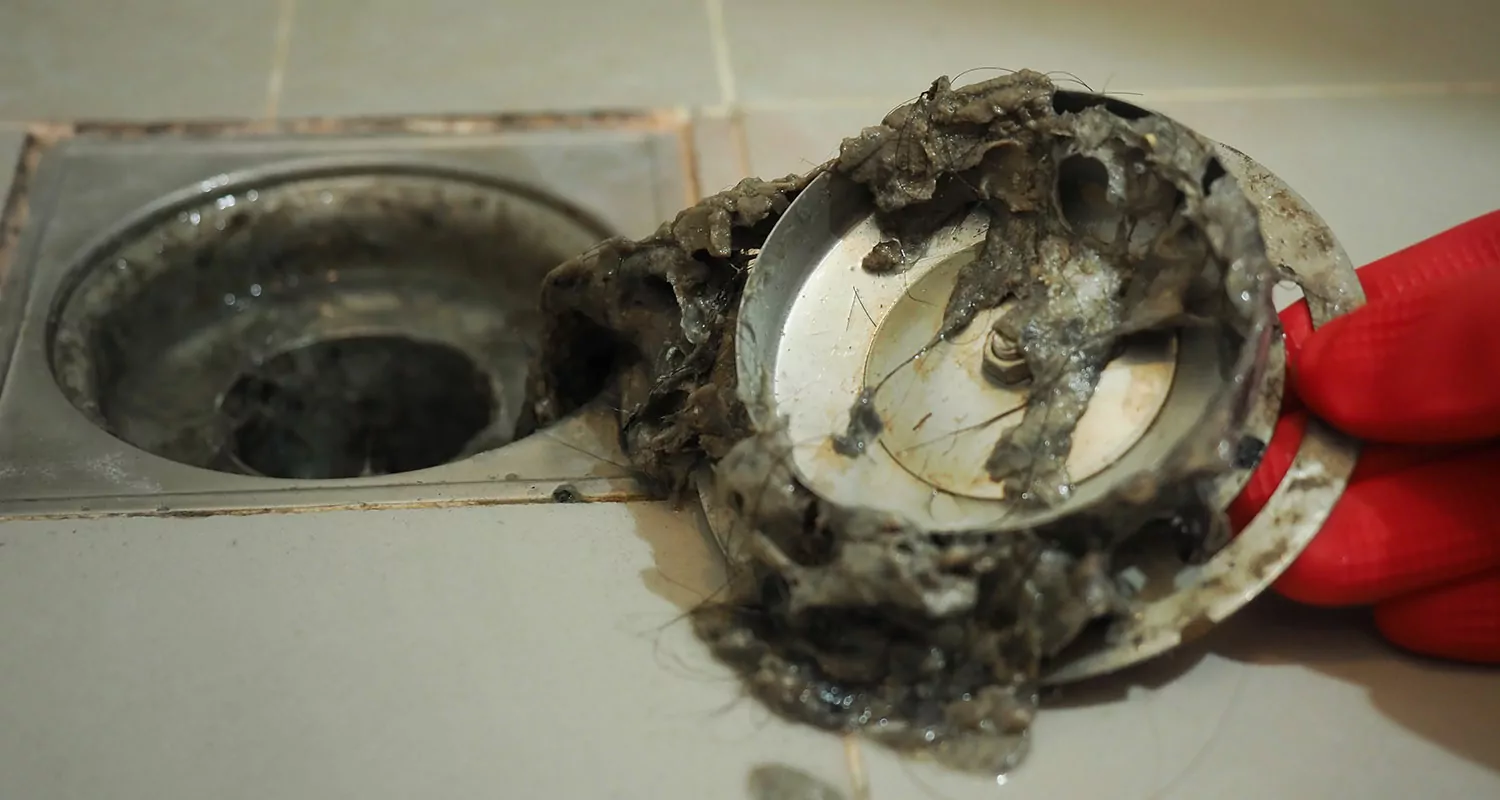Dealing with a smelly shower drain can be a frustrating and unpleasant experience. The foul odors that emanate from your shower drain can make your whole bathroom smell bad and ruin your showering experience. But what causes these unpleasant smells, and how can you quickly fix the problem?
One of the main culprits behind a smelly shower drain is the accumulation of hair, soap scum, and other debris that get caught in the drain pipe. Over time, this build-up can lead to clogs and create a breeding ground for bacteria and mold. Additionally, a dry P-trap—the U-shaped pipe beneath the drain cover—can allow sewer gases to escape and cause a foul odor in your bathroom.
If you’re wondering why your shower drain smells, worry not! There are several quick fixes that you can try to get rid of the unpleasant smells and restore your shower to its fresh, clean state.
Key Takeaways:
- Smelly shower drains can be caused by the accumulation of hair, soap scum, and debris in the drain pipe.
- A dry P-trap can allow sewer gases to escape and cause foul odors in the bathroom.
- Quick fixes for a smelly shower drain include removing the drain cover and clearing out visible hair or debris, using a drain snake to remove deeper clogs, and using a mixture of baking soda and vinegar to clean the drain.
- If DIY solutions don’t work, it may be necessary to call a professional plumber to address any underlying plumbing issues.
- Prevent smelly shower drains by regularly cleaning the drain, using hair catchers, running hot water down the drain, and properly disposing of waste materials.
How to Remove Clogs and Odors in the Shower Drain
Regular maintenance and cleaning of your shower drain is crucial to prevent clogs and eliminate unpleasant odors. In this section, we will explore effective methods to remove clogs and address odors in your shower drain.
1. Clearing Clogs with a Drain Snake
This is a highly effective tool for removing stubborn clogs in your shower drain. Insert the snake into the drain opening and rotate it clockwise to catch onto hair and debris. Gently pull out the clog to clear the drain. This method allows you to reach deeper into the pipe and tackle the root cause of the clog.
2. Using Baking Soda and Vinegar
A mixture of baking soda and vinegar can also help remove clogs and neutralize odors in your shower drain.
Begin by pouring half a cup of baking soda down the drain. Follow this by pouring a cup of vinegar into the drain, causing a foaming reaction.
Allow the mixture to sit for about 30 minutes and then flush the drain with hot water. This combination helps break down the clog and eliminate any unpleasant smells.
3. Chemical Drain Cleaners (Use with Caution)
Chemical drain cleaners can be another option for tackling clogged shower drains. However, it’s important to follow the instructions carefully and choose cleaners that are safe for your specific type of pipes.
Harsh chemicals can not only damage the pipes but also pose health risks. Exercise caution and use these cleaners sparingly.
4. Addressing Biofilm Buildup and Mold Growth
Biofilm buildup and mold growth are common causes of musty odors in shower drains. Regular cleaning with a mixture of baking soda and vinegar can help prevent the formation of biofilms and eliminate mold.
Apply the mixture to the drain and let it sit for about 15 minutes before flushing with hot water. This cleaning routine will keep your drain smelling fresh and prevent further buildup.
5. Preventing Dry P-Traps and Sewer Gases
A dry P-trap is another culprit behind unpleasant odors in a shower drain. If your shower is rarely used, the water in the P-trap can evaporate, allowing gases to escape into your bathroom. To prevent this, run water periodically in the shower to keep the trap filled.
If these DIY methods do not resolve the clogs and odors in your shower drain, it may be necessary to consult a professional plumber. They can assess the situation, identify any underlying plumbing issues, and provide the necessary repairs to keep your shower drain clean and odor-free.
| Method | Description |
|---|---|
| Drain Snake | A tool for removing stubborn clogs by reaching deeper into the drain. |
| Baking Soda and Vinegar | A foaming reaction that breaks down clogs and neutralizes odors. |
| Chemical Drain Cleaners | Use with caution to remove clogs, but be mindful of potential pipe damage and health risks. |
| Biofilm Buildup and Mold Growth | Regular cleaning with baking soda and vinegar prevents these issues and eliminates odors. |
| Dry P-Traps and Sewer Gases | Keep the trap filled with water to prevent sewer gases from escaping. |
Tips for Preventing Smelly Shower Drains

Preventing smelly drains is essential for maintaining a fresh and pleasant bathroom environment. By following a few simple tips, you can minimize the chances of experiencing unpleasant odors and costly plumbing issues.
The first step in preventing smelly drains is regular cleaning and maintenance. Make it a habit to remove hair and other debris from the drain on a regular basis. You can use a drain cover or hair catcher to prevent hair from accumulating and causing clogs and odors.
In addition to regular cleaning, it is important to practice proper waste disposal. Avoid flushing items that can cause clogs, such as cotton swabs, sanitary pads, or wet wipes. Proper waste disposal can go a long way in preventing foul smelling shower drains.
Another effective preventive measure is to regularly run hot water down the drain. Hot water helps prevent the buildup of soap scum and other residues that can lead to clogs and foul smells. By making this a regular practice, you can keep your shower drain clean and smelling fresh.
Lastly, it is crucial to inspect your plumbing system regularly. Look for any signs of leaks or other issues that may contribute to smelly drains. Early detection and prompt repairs can help prevent larger plumbing problems down the line.
By implementing these tips for preventing smelly drains – regular cleaning, using hair catchers, regular use of hot water, proper waste disposal, and inspecting your plumbing system – you can enjoy a clean and fresh-smelling bathroom and avoid costly plumbing repairs in the future.
What you should do next
Found this post helpful but still facing challenges with your plumbing? If you’re in the San Antonio area, the next step is simple: contact Chambliss Plumbing Company. Our team is ready to provide you with professional, reliable solutions tailored to your specific needs.
Whether it’s a persistent drain issue, a plumbing emergency, or a routine check-up, we have the expertise and experience to ensure everything flows smoothly in your home.
Don’t let plumbing problems disrupt your day-to-day life. Reach out to us now or give us a call at (210) 490-7910!
FAQ
Why does my shower drain smell?
The unpleasant odor coming from your shower drain can be caused by various factors, including the accumulation of hair, skin, dirt, and soap scum in the drain pipe.
This buildup can lead to clogs and create a foul smell. Additionally, biofilm buildup, mold growth, or a dry P-trap can also contribute to the bad odor.
How can I remove clogs and odors in the shower drain?
There are several DIY methods you can try to remove clogs and eliminate odors in your shower drain. You can use a snake to clear out any visible hair or debris causing the clog.
Another effective method is to pour a mixture of baking soda and vinegar down the drain, which will create a foaming reaction that helps break down the clog and neutralize odors.
Chemical drain cleaners can also be used, but it’s important to follow the instructions carefully and avoid harsh chemicals that may damage the pipes.
If the DIY methods don’t work, it’s recommended to call an expert plumber to address the issue.
When should I call a professional plumber for my smelly shower drain?
If the DIY methods mentioned above don’t resolve the issue, or if you suspect there may be underlying plumbing problems such as leaky pipes or damaged drain lines, it’s best to call a professional.
Licensed plumbers have the expertise and tools necessary to identify and fix any plumbing issues causing the smelly drain.
